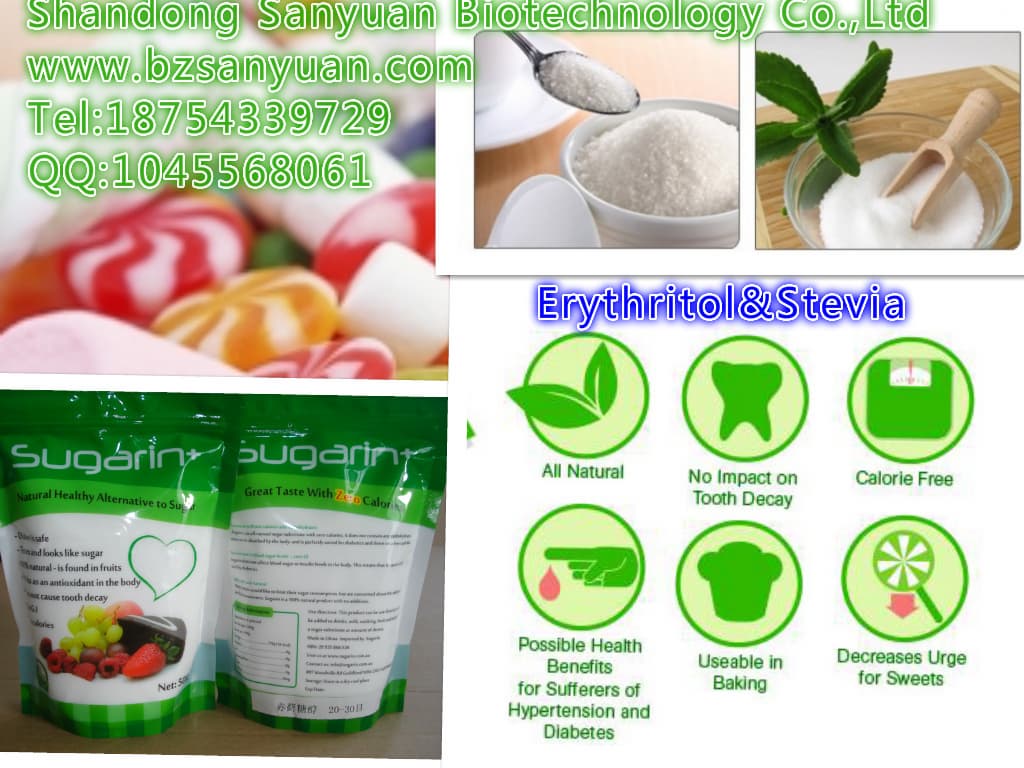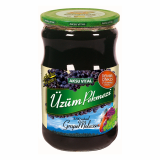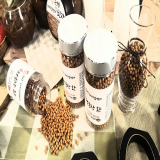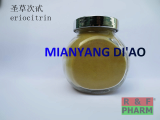Erythritol blend stevia
Negotiable Min Order Quantity Unit
- Required Quantity
-
- Place of Origin
- China
- Brand name
- Tianlvyuan
- Payment Terms
- Negotiable
- Production method
- Negotiable
- Shipping / Lead Time
- Negotiable / Negotiable
- Keyword
- additives, erythritol, stevia, sweetener
- Category
- Food Additives
Binzhou Sanyuan Biotech Co., Ltd
- Verified Certificate
-
14

| Product name | Erythritol blend stevia | Certification | - |
|---|---|---|---|
| Category | Food Additives | Ingredients | - |
| Keyword | additives , erythritol , stevia , sweetener | Unit Size | - |
| Brand name | Tianlvyuan | Unit Weigh | 25 kg |
| origin | China | Stock | - |
| Supply type | - | HS code | - |
Product Information
What is Erythritol?
Erythritol is a naturally-derived sugar substitute that looks and tastes very much like sugar, yet has almost no calories. It comes in granulated and powdered forms.
Erythritol has been used in Japan since 1990 in candies, chocolate, yogurt, fillings, jellies, jams, beverages, and as a sugar substitute.
Erythritol is classified as a sugar alcohol. Sugar alcohols, also called polyols, are sugar substitutes that are extracted from plants. One of the more common sugar alcohol sweeteners is xylitol.
Sugar alcohols also occur naturally in plants. Erythritol is found naturally in small amounts in grapes, melons, mushrooms, and fermented foods such as wine, beer, cheese, and soy sauce.
How Sweet is Erythritol?
Erythritol is approximately 70 percent as sweet as table sugar (sucrose). Some manufacturers, however, claim that their erythritol products are as sweet as sugar.
How is Erythritol Made?
Erythritol is usually made from plant sugars. Sugar is mixed with water and then fermented with a natural culture into erythritol. It is then filtered, allowed to crystallize, and then dried. The finished product is white granules or powder that resembles sugar.
Why Do People Use Erythritol?
- Erythritol has almost no calories. In the United States, erythritol is labeled as having 0.2 calories per gram, which is 95 percent fewer calories than sugar. In Japan, erythritol is labeled as having zero calories.
- Erythritol has not been found to affect blood sugar or insulin levels and has a zero glycemic index.
- Erthyritol has a clean, sweet taste. I've found that it’s more similar in taste to sugar than other natural sweeteners such as stevia (which can be bitter).
- In reasonable amounts, erythritol doesn’t cause digestive upset and diarrhea that other sugar alcohols like sorbitol and xylitol are known to cause. This is because erythritol is a smaller molecule and 90 percent of erythritol is absorbed in the small intestine and for the most part excreted unchanged in urine. This quality makes erythritol unique among the sugar alcohols.
- Erythritol isn’t metabolized by oral bacteria, which means that it doesn’t contribute to tooth decay. Erythritol was approved for use as a sugar substitute in Japan in 1990. In the United States, it is classified as being Generally Recognized As Safe (GRAS) since 1997. It was approved in Australia and New Zealand in 1999.
What are the Side Effects?
Excessive consumption of erythritol (over 80 grams per day) may result in digestive upset, diarrhea, and bloating.
What are the Downsides of Erythritol?
-
- Erythritol has a cooling effect on the mouth, unlike sugar.
- Erythritol isn’t as sweet as sugar. It is approximately 70 percent as sweet.
- Erythritol doesn’t dissolve as easily as sugar.
- Erythritol has a cooling effect on the mouth, unlike sugar.
B2B Trade
| Price (FOB) | Negotiable | transportation | - |
|---|---|---|---|
| MOQ | Negotiable | Leadtime | Negotiable |
| Payment Options | Negotiable | Shipping time | Negotiable |
- President
- Nie
- Address
- NO.89 Zhangfu Road Binbei Binzhou City Shandong Province
- Product Category
- Food Additives
- Main Product



































 China
China








